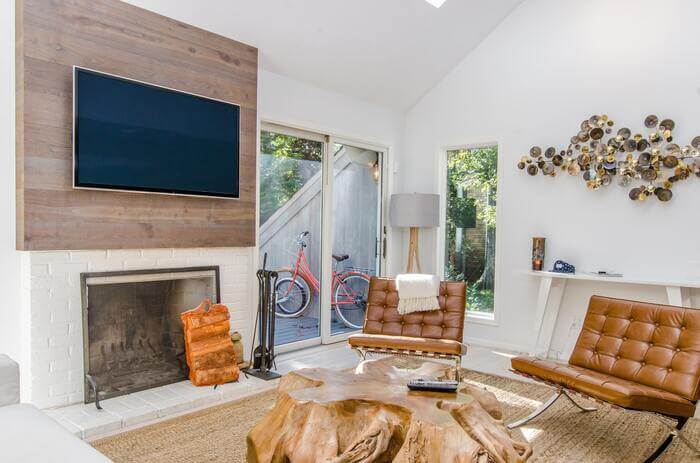Airbnb Neighbor Complaints: How To Prevent Them and Keep Neighbors Happy

Two of the most unpleasant experiences Airbnb hosts can have are unruly guests and unhappy neighbors. Airbnb neighbor complaints can cause serious obstacles for your business, so it’s crucial to prevent them from happening — and have a plan in place if they do.
And, taking a look at it from their perspective, it’s easy to understand a neighbor getting upset if they have to bear the brunt of a bad guest. Neighbors complain for any number of reasons, including noise, illegal parking, smoking in non-smoking areas, and so on. As the Airbnb host, it’s your job to set clear house rules and screen potential guests to control the noise levels.
Read on to unpack what leads to a neighbor complaint, what action your neighbors can take against your guests, and how to safeguard your business.
What Leads To An Airbnb Neighbor Complaint?
A neighbor complaint about your Airbnb rental occurs when there is a conflict between your neighbor and your Airbnb guests. This conflict could be caused by excessive noise in a normally quiet neighborhood, parking on your neighbor’s property, or late-night parties.
Understandably, your neighbors are not the ones who signed on to host your Airbnb guests, so they may feel wronged if there’s excessive noise or uncontrollable guests. This is what will spur them to make complaints against your short-term rental.

What Action Can Neighbors Take Against Airbnb Hosts?
If your neighbor has noise behavior complaints about your guests, they have a few options for what action they can take. Some more preferable than others.
-
Complain to you directly
This is probably the best first course of action to take. If your neighbor complains to you directly, you can keep law enforcement and Airbnb support out of the situation — as long as you are able to respond appropriately and resolve the issue before it gets out of hand.
If your neighbor complains about your guests to you and you don’t do anything about it, you may lose their trust. If they believe you won’t take action, they’ll stop coming to you directly and rather get the third parties involved. This could pose more trouble for your short-term vacation rental.
-
Check if your Airbnb breaks any municipal or community laws and regulations
Your area or apartment building may have specific rules about noise and behavior, and if these rules are broken by your guests, your neighbors may be able to call local police, code enforcement, or building management.
Therefore, it is important to be fully aware of the rules and regulations in your area, and include them in your house rules too, so that your guests can abide by them as well.
-
Report your property to Airbnb
The Airbnb platform has a Neighborhood Support process where your neighbor is able to submit a complaint online. Airbnb allows concerned neighbors to report noise or a party, neighborhood concerns, personal safety concerns, or other issues.
If a neighbor reports a listing to Airbnb this way, Airbnb will review the issue and get in touch with the hosts of the Airbnb listings. They will also do a follow-up investigation and report back to the neighbor if needed.
While the case would have to be quite extreme for Airbnb to suspend or take down your listing, having multiple complaints against your listing on Airbnb will not be a good thing for your business. So, it’s best to be proactive from the start.

-
Call law enforcement
If your guests are breaking noise codes, your neighbors might even decide to call law enforcement as a last resort. Not only will this affect your relationship with other neighbors, it’ll ruin any chance you have of a good review (which is critical to the success of your short-term rental property).
Your rental property forms a part of a greater community and if you want to make sure your Airbnb runs smoothly, then you need to state and enforce community rules in your rental property. Send these rules to any upcoming guests and have them sign a form that shows they have accepted these rules and intend to follow them.
-
File a lawsuit against you
If things get really out of hand, your neighbor may be able to elevate their neighbor complaints and take legal action against you in a small claims court. Dollar limits will differ depending on what state you’re in. For example, Los Angeles has a $10,000 limit on small claims.
This isn’t any cause for panic yet though, as this would be the last resort for anyone to take. Lawsuits are time-consuming, expensive, and risky. Because of this, it is in the interest of everyone involved to resolve the issue before it gets to this point.
Now it’s time to take a look at what you can do to prevent neighbor complaints altogether. Read on for our best tips to keep your neighbors happy.

How Can I Prevent Complaints About My Short-Term Vacation Rental?
Keeping your neighbors happy requires more than just asking your guests to be considerate and crossing your fingers that they don’t cause any noise complaints. To keep on top of things, it’s a smart idea to be proactive to avoid any issues. Here’s how to do it:
1. Communicate with neighbors
Keeping the lines of communication open between you and your neighbors is one of the easiest of most effective steps to take. Building these relationships will allow your neighbor to feel comfortable enough to contact you when they have concerns. It will also ensure they are kept in the loop at all times.
If you don’t have a relationship with your neighbor yet, now is the best time to start. You could either go over to their place or invite them to yours to introduce yourself. It also doesn’t hurt to give them a small gift as a kind gesture, like a bottle of wine or a box of chocolates.
You should also tell them about your Airbnb and how you run it. Most importantly, you should let them know how they can contact you if they have any issues.
Then, it’s also a smart idea to keep them informed about your bookings. Sending them a text message well in advance letting them know when guests are meant to arrive and leave will help them plan ahead and be aware of what’s happening around their property.

2. Invest in noise management tools and software
The proptech industry is growing rapidly, offering technological solutions to every issue within the property management industry. One such solution is noise management tools and software.
Privacy-safe noise-measurement devices like the ones offered by Noiseaware can help to monitor sound remotely and reduce the risk of guests getting too noisy.
These devices are able to measure the decibel levels of noise, as well as its duration. By not recording any specific sounds or conversations, guests will still be able to keep their privacy.
Hosts are able to monitor the noise levels online and can contact their guests if things become too loud. This means that you will be able to stop the noise before it travels next door.
- Seamless integration with Minut Noise Monitor
iGMS has launched a new integration with Minut. Combining Minut’s noise resolution tech with our robust tools means that you can protect your rentals remotely without having to be on call 24/7.
The integration allows you to sync your Minut properties with your iGMS guest data. If loud noise is detected at a property, the guest will automatically receive a message, letting them know to keep it down.
See how to set up the integrations via the Minut web app.

3. Screening potential guests before accepting their reservation
Another preventative measure is to screen your guests before you accept their reservations. Bad guests tend to leave a trail in their wake, and can very quickly decimate your Airbnb business. A bad guest will also leave tell-tale signs that hosts can look out for. Some of these red flags include:
- Poor communication from the guest
- An incomplete or deceptive-looking Airbnb profile
- Bad reviews from other hosts (or direct complaints)
- Reluctant to give you important personal information (ID numbers, payment information, etc.).
Although it is possible to screen your guests manually, this can get time-consuming if your guest turnover is frequent. If this is the case, guest screening software like Safely will help you save time while giving you the peace of mind that your guests have been screened and verified before arrival at your vacation rental.
4. Take advantage of host reviews
As mentioned above, reading host reviews of potential guests is an important part of screening your guests and protecting your next-door neighbors from excessive noise and difficult behavior.
While Airbnb allows guests to review their stay, it also allows Airbnb hosts to review their experience with their guests. This is a great way to benefit from other hosts’ experiences. If other hosts are complaining about a potential guest — especially if it’s because they were the cause of noise complaints or rude behavior — common sense would lead the next Airbnb host to avoid taking on the same guest.
5. Ensure you abide by the regulations of your area
Going against the HOA regulations, local or zoning laws, or general regulations of your area is never a good idea. It could lead to hefty fines, trouble with local authorities and city governments, or serious obstacles for your Airbnb vacation rental business.
Therefore, even before starting up your Airbnb business, it’s important to be fully aware of the vacation rental rules and regulations that apply to your property so that you take care not to violate them.
6. Ensure you provide clear parking instructions
While noise complaints are usually the number one grievance among next-door neighbors, having your guests park in their parking space or in front of their property may not go down well with them either.
This can easily be prevented by giving your guests clear parking instructions in their check-in information. By doing so, your guests won’t need to make assumptions about where to park and end up parking in the wrong place.

7. Limit the number of guests allowed
Limiting your guests is especially necessary for short-term rentals in a quiet residential neighborhood. Noise complaints are more likely to happen if you have a large number of guests staying at your short-term rental at one time.
So, to prevent noise complaints, you should limit the number of guests allowed on your property.
The rule of thumb is to allow the number of guests that can be accommodated comfortably by the number of bedrooms in your short-term rental. Accommodating extra guests on the couch or day visitors is not recommended if your goal is to prevent or reduce noise complaints.

8. Do not allow parties and events
Parties and events are the roots of all noise evils for short-term rentals. They attract large crowds, loud music, and wild, misbehaving guests. When a residential area complains about Airbnb ruining neighborhoods, it’s usually the parties that are to blame. Do yourself a favor and prohibit parties in your Airbnb listing altogether.
If your Airbnb rental is in a family neighborhood and preventing a noise problem is a priority, the best thing to do would be to not allow any parties or events at your short-term rentals.
9. Clearly communicate house rules and penalties for breaking them
Hosts of vacation rentals, as well as their neighbors next door, should not assume that Airbnb guests will automatically know the house rules and how to behave. Most hosts may assume that guests will automatically know to be quiet at night, and for most guests, this may be true. However, it’s always better to clearly state quiet times and your policies on parties and extra guests in the house rules.
Not only will this eliminate any confusion and ensure guests are aware of what they can and can’t do, but it will also give you leverage to enforce them. You can add a disclaimer to your house rules that a guest could incur penalties if the house rules are broken. These penalties could be a deduction from their security deposit or even eviction from the short-term rental.
Keeping the lines of communication open between you and your guest is just as important as communicating with your neighbors next door when you want to prevent complaints. This, of course, takes time. Each guest will need personal communication delivered just before their stay to ensure they are made aware of the rules of your short-term rental. This is where vacation rental software comes in handy.
Vacation rental software like iGMS saves hosts tons of time without compromising on the quality of their guest experience and communication. The powerful platform provides all the tools you need to:
- Automate guest messaging, like sending check-in instructions and house rules
- Set triggers to reply to your guest instantly
- Manage multiple accounts and listings across the top booking platforms from a single interface
- Synchronize reservations across multiple platforms and your website to eliminate the risk of getting a double-booking
- Create your own direct bookings website in minutes with our Website Builder
- Connect your Stripe account to iGMS to receive payouts and create invoices
- Automate guest and host review send-outs
- Share daily cleaning schedules and auto-assign cleaning tasks
- Take advantage of smart pricing tools through integrations with PriceLabs, Beyond, DPGO, and Wheelhouse.
About the Author
Callan Riddles is the Content and Social Media Specialist at iGMS. Callan has a passion for finding new ways to help vacation rental businesses thrive. In her free time, she loves to travel, read, and experience all the new things that life has to offer.






![Your Monthly iGMS Roundup [February 2020]](/content/images/size/w600/wordpress/2020/02/igms-roundup-feb-2020-cover.png)

